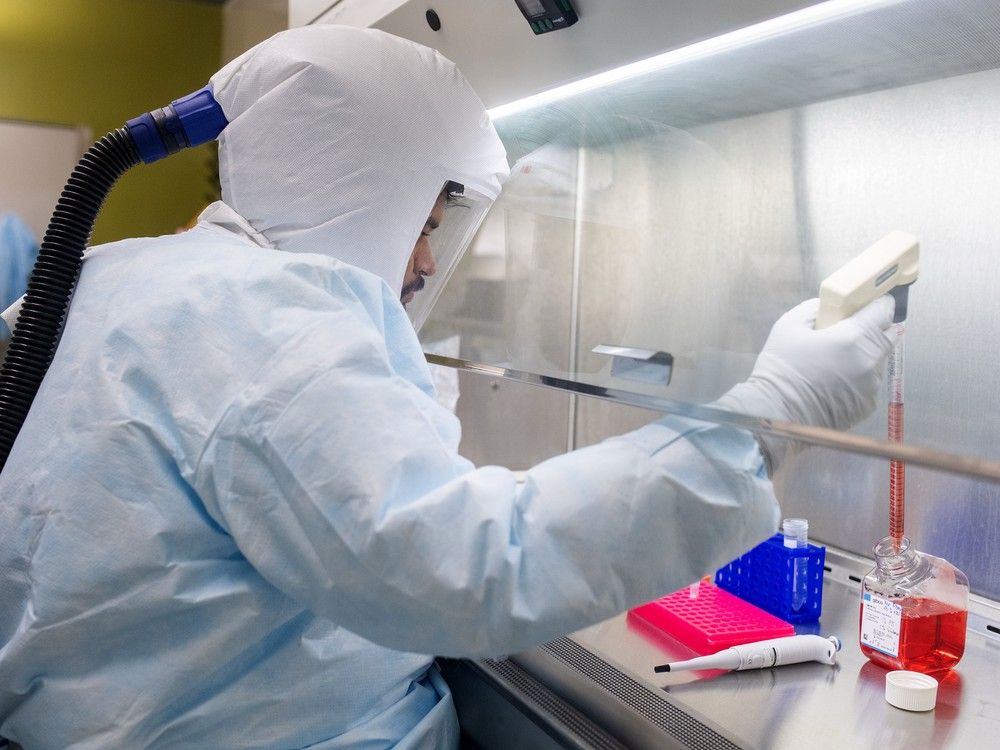Health
Saskatoon’s VIDO Celebrates 50 Years Amid Funding Concerns

As the Vaccine and Infectious Disease Organization (VIDO) in Saskatoon marks its 50th anniversary, researchers express concern over recent changes in U.S. funding policies that could disrupt global health efforts. Virologist Angela Rasmussen, affiliated with VIDO, noted that decreased investment in vaccine development in the U.S. could have far-reaching implications for researchers worldwide. “Having all of that capacity gone from the U.S. is really going to affect researchers around the world,” she stated, emphasizing that these challenges extend beyond public vaccine hesitancy.
In the wake of funding cuts from the U.S. government, Dr. Arinjay Banerjee, another leading virologist at VIDO, highlighted the necessity for Canada to step in to fill the gaps left by U.S. hesitancy. “It’s an opportunity for us to step up and fill the gap that’s being created globally,” he remarked, underscoring the importance of maintaining momentum in infectious disease research.
VIDO’s Role in Global Health Research
VIDO, located on the University of Saskatchewan campus, has evolved from a local livestock laboratory since its inception in 1975 into a prominent center for infectious disease research, employing over 200 scientists and staff. The organization plays a critical role in the global fight against pandemics and is actively engaged in the “100 Days Mission,” an initiative supported by G20 countries aimed at developing vaccines within 100 days of identifying a pandemic threat.
During the COVID-19 pandemic, VIDO achieved significant milestones, including isolating SARS-CoV-2 from Canada’s first case and being the first Canadian institution to move a potential vaccine into clinical trials. However, these achievements are now overshadowed by concerns stemming from the U.S. administration’s decision to cut billions in funding from the National Institutes of Health, which had a budget of US$48 billion last year.
Rasmussen pointed out that while Canada’s own funding through the Canadian Institutes of Health Research totals about $1 billion annually, it falls short of compensating for the loss of U.S. funds. “I hope that the government steps up and is able to make a larger investment,” she urged, highlighting the financial constraints faced by private foundations and other governments in matching U.S. funding levels.
Addressing Vaccine Hesitancy and Misinformation
In a recent statement, VIDO acknowledged the potential financial impacts resulting from U.S. funding disruptions and emphasized its commitment to supporting researchers who might lose grant money. “A structured process is in place to help address lost funding and ensure continuity of critical research activities,” the statement read.
Rasmussen attributed the funding cuts to vaccine hesitancy, which she claims has been exacerbated by the actions of U.S. officials, including former health secretary Robert F. Kennedy Jr.. Kennedy’s decision to halt funding for mRNA vaccine projects and his claims regarding their safety have been met with widespread criticism from the scientific community. “The fight against disinformation is going to be one of the great challenges of our generation of scientists,” Rasmussen asserted.
The director of VIDO, Volker Gerdts, expressed surprise at the growing skepticism towards vaccines. He emphasized the need for improved communication with the public regarding the benefits of vaccines and the importance of ongoing research efforts at VIDO. “There is so much misinformation out there, particularly on social media, where people can access a plethora of false information,” he noted.
As VIDO celebrates its 50 years of contributions to vaccine research and development, the organization faces the challenge of navigating a changing funding landscape while remaining a vital player in the global health arena.
-

 Education3 months ago
Education3 months agoBrandon University’s Failed $5 Million Project Sparks Oversight Review
-

 Science4 months ago
Science4 months agoMicrosoft Confirms U.S. Law Overrules Canadian Data Sovereignty
-

 Lifestyle3 months ago
Lifestyle3 months agoWinnipeg Celebrates Culinary Creativity During Le Burger Week 2025
-

 Health4 months ago
Health4 months agoMontreal’s Groupe Marcelle Leads Canadian Cosmetic Industry Growth
-

 Technology3 months ago
Technology3 months agoDragon Ball: Sparking! Zero Launching on Switch and Switch 2 This November
-

 Science4 months ago
Science4 months agoTech Innovator Amandipp Singh Transforms Hiring for Disabled
-

 Education3 months ago
Education3 months agoRed River College Launches New Programs to Address Industry Needs
-

 Technology4 months ago
Technology4 months agoGoogle Pixel 10 Pro Fold Specs Unveiled Ahead of Launch
-

 Business3 months ago
Business3 months agoRocket Lab Reports Strong Q2 2025 Revenue Growth and Future Plans
-

 Technology2 months ago
Technology2 months agoDiscord Faces Serious Security Breach Affecting Millions
-

 Education3 months ago
Education3 months agoAlberta Teachers’ Strike: Potential Impacts on Students and Families
-

 Science3 months ago
Science3 months agoChina’s Wukong Spacesuit Sets New Standard for AI in Space
-

 Education3 months ago
Education3 months agoNew SĆIȺNEW̱ SṮEȽIṮḴEȽ Elementary Opens in Langford for 2025/2026 Year
-

 Technology4 months ago
Technology4 months agoWorld of Warcraft Players Buzz Over 19-Quest Bee Challenge
-

 Business4 months ago
Business4 months agoNew Estimates Reveal ChatGPT-5 Energy Use Could Soar
-

 Business3 months ago
Business3 months agoDawson City Residents Rally Around Buy Canadian Movement
-

 Technology2 months ago
Technology2 months agoHuawei MatePad 12X Redefines Tablet Experience for Professionals
-

 Business3 months ago
Business3 months agoBNA Brewing to Open New Bowling Alley in Downtown Penticton
-

 Technology4 months ago
Technology4 months agoFuture Entertainment Launches DDoD with Gameplay Trailer Showcase
-

 Technology4 months ago
Technology4 months agoGlobal Launch of Ragnarok M: Classic Set for September 3, 2025
-

 Technology4 months ago
Technology4 months agoInnovative 140W GaN Travel Adapter Combines Power and Convenience
-

 Science4 months ago
Science4 months agoXi Labs Innovates with New AI Operating System Set for 2025 Launch
-

 Top Stories2 months ago
Top Stories2 months agoBlue Jays Shift José Berríos to Bullpen Ahead of Playoffs
-

 Technology4 months ago
Technology4 months agoNew IDR01 Smart Ring Offers Advanced Sports Tracking for $169










